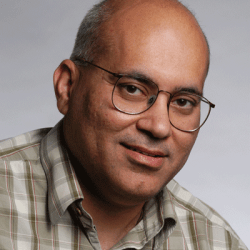Professor Arun Majumdar received a B.Tech in Mechanical Engineering from the Indian Institute of Technology, Bombay (IIT-B) in 1985, and a PhD in Mechanical Engineering from the University of California, Berkeley in 1989, for research conducted in the laboratory of Professor Chang-Lin Tien. After being on the faculty of Arizona State University (1989-92) and University of California, Santa Barbara (1992-96), he began his faculty appointment in the Department of Mechanical Engineering at the University of California, Berkeley on January 1, 1997.
Researchers at CITRIS
Jitendra Malik
Arthur J. Chick Professor of Electrical Engineering and Computer Science, UC Berkeley
Professor Carlos Maltzahn
Carlos Maltzahn is an Associate Adjunct Professor at the Computer Science Department of the Jack Baskin School of Engineering, Director of the UCSC Systems Research Lab, Associate Director of the UCSC/Los Alamos Institute for Scalable Scientific Data Management, co-PI of the Petascale Data Storage Institute, and a faculty member of the Storage Systems Research Center, all at the University of California, Santa Cruz.
Roberto Manduchi
Professor of Computer Science and Engineering, UC Santa Cruz
Marc Mangel
Professor Marc Mangel was educated at the University of Illinois (BS in Physics 1971 with High Honors, MS in Biophysics 1972), where he was an EJ James Scholar, NIH Trainee in biophysics and elected to Phi Kappa Phi and Phi Beta Kappa, and the University of British Columbia (PhD in Applied Mathematics and Statistics, with a focus on Mathematical Biology, 1978). He worked for the Center for Naval Analyses (CNA, the research and development center for the US Navy) from Nov 1977-Aug 1980.
Roummel Marcia
Research areas: Nonlinear nonconvex optimization, mathematical signal processing and compressive sampling, numerical linear algebra, and computational biochemistry.
James Marcin
Co-Director, CITRIS Health
Laura Marcu
Research Interest
Optical Spectroscopy and Imaging, Biophotonic Technology Development:
The mission of our research laboratory is to promote better diagnostic, treatment and prevention of human diseases through advancements in biophotonic technology – a field at the interface of physical sciences, engineering, biology and medicine. This is accomplished through a series of interdisciplinary research projects that enable early diagnosis and intraoperative demarcation of tumors, prevention of stroke and heart attack, and cancer therapy.
Gerard Marriott
Professor of Bioengineering, UC Berkeley
Alejandro Martinez
My research interests, described above, are well-aligned with two of CITRIS’ initiatives: sustainable infrastructure and people and robots. My research on bioinspired processes, in collaboration […]
Ashlie Martini
University of California, Merced
School of Engineering
Dominic Massaro
Professor Emeritus of Psychology, UC Santa Cruz
Michael Mateas
I run the Expressive Intelligence Studio at UC Santa Cruz, where we explore the intersection of artificial intelligence, art and design. Our goal is to create compelling new forms of interactive art and entertainment that provide more deeply autonomous, generative and dynamic responses to interaction. A major thrust of this work is advanced AI for videogames, including autonomous characters and interactive storytelling.
Teenie Matlock
Teenie Matlock is Founding Faculty, Professor of Cognitive Science, and McClatchy Chair of Communications in the Cognitive and Information Sciences Program at University of California, Merced. She is also Affiliate Faculty in the Institute of Cognitive and Brain Sciences at UC Berkeley, and Senior Researcher at the International Institute of Computer Science. Her research is a combination of cognitive linguistics, psycholinguistics, and human-computer interaction.
Stephen Maurer
Stephen M. Maurer is Director of the Goldman School Project on Information Technology and Homeland Security (“ITHS”). ITHS serves as a focal point for the School’s science, innovation, technology initiatives. Maurer teaches and writes in the fields of homeland security, innovation policy, and the new economy.
From 1982 to 1996, Maurer practiced high technology and intellectual property litigation at leading law firms in Arizona and California.
Professor Nelson Max
Professor Max’s research interests are in the areas of scientific visualization, computer animation, and realistic computer graphics rendering. In visualization he works on molecular graphics, and volume and flow visualization, particularly on irregular finite element meshes. He has rendered realistic lighting effects in clouds, trees, and water waves, and has produced numerous computer animations, shown at the annual Siggraph conferences, and in Omnimax at the Fujitu Pavilions at Expo ’85 in Tsukuba Japan, and Expo ’90 in Osaka Japan.
Kara McCloskey
Associate Professor
UC Merced
Karen McDonald
Using the tools of genetic engineering, recombinant proteins can be produced using a variety of expression systems and hosts, including microbial, mammalian, insect, plant or algal cells grown in bioreactors as well as transgenic animals and plants. Our laboratory is developing novel expression systems (i.e.
Charlie McDowell
Charlie McDowell is a Professor in the Computer Science Department at the University of California, Santa Cruz.
Steve McGuire
Assistant Professor of Electrical and Computer Engineering, UC Santa Cruz
Josué Medellín-Azuara
Associate Professor of Environmental Engineering, UC Merced
Mónica Medina
What are the real ecological effects of humans’ changes to the Earth – changes like ocean water pollution or global warning? One way to help find out is by studying the health of some very basic creatures such as corals.
Negar Mehr
Assistant Professor of Mechanical Engineering, UC Berkeley
Alan Meier
Alan Meier teaches core energy efficiency courses and supervises graduate student activities at EEC. Dr. Meier is also a Senior Scientist at Lawrence Berkeley National Laboratory. His research has focused on understanding how people (and machines) use energy and the opportunities that exist for them (and technologies) to conserve.
Professor Barbara Mellers
In January 2011, Barbara Mellers was appointed as the 11th Penn Integrates Knowledge Professor. Mellers, a globally influential scholar of decision making, is the I. George Heyman University Professor. This appointment will is shared between the Department of Psychology in the School of Arts and Sciences and the Department of Marketing in The Wharton School.
Ali Mesbah
Assistant Professor
UC Berkeley Chemistry























